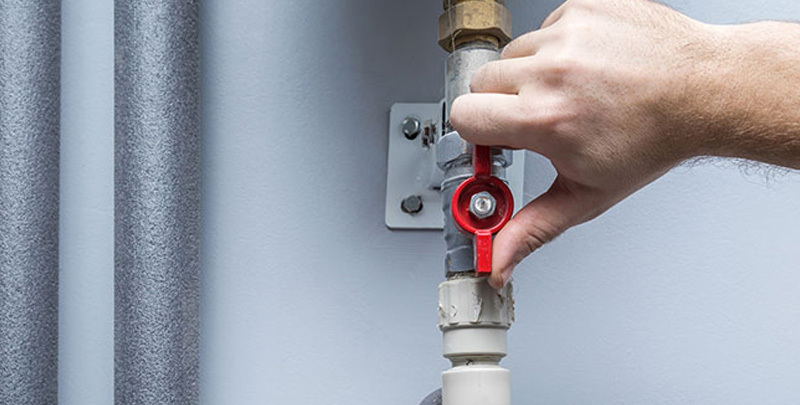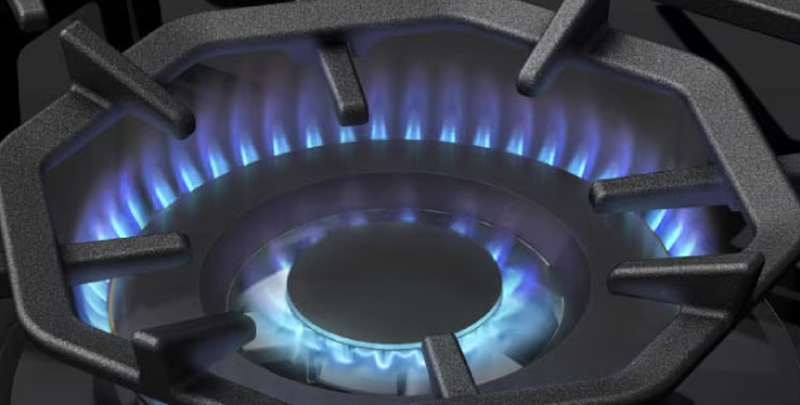Can a Gas Leak Cause an Explosion?

For those who have gas appliances in their homes, you might have often wondered: can a gas leak cause an explosion?
Well, in this comprehensive post, we’ll explore these complexities and shed light on your questions.
What’s in the Gas?
In its purest form, natural gas mainly consists of methane gas. Besides being highly flammable, methane is lighter than air. When a natural gas leak occurs, the gas tends to rise and provide a potential explosion risk. That is, if there’s an ignition source in its path.
Why Do Gas Leaks Happen?
Faulty appliances, from gas stoves to furnaces, often consist of the most substantial part of the issue. If an appliance isn’t correctly installed or has been poorly maintained, a gas leak may occur. Older appliances or gas lines are also more prone to leaks. Over time, wear and tear can cause weakening areas where leaks can spring up.
Corrosion is another problem, particularly with natural gas pipelines supplying the neighbourhood or individual homes. Often, natural gas leaks can happen away from the house at the supply source, becoming quite dangerous before they’re noticed.
When Does a Gas Leak Become an Explosion?
A gas leak can lead to an explosion when certain conditions align. The primary cause of a gas explosion is the ignition of a blend of air and flammable gas, typically resulting from a gas leak.
For an explosion to happen, an ideal concentration of leaking gas and oxygen in the air within a confined space is required. This mix is generally between 5-15% for gases such as natural gas, methane, propane, and butane.
When this specific gas-air mix comes into contact with a source of ignition, such as a spark or heat, an explosion can follow. Even common appliances like gas stoves or light switches can spark. Under the right circumstances, they can ignite the gas and cause an explosion.
Spotting the Signs of a Gas Leak
A gas leak can pose significant risks, and it’s crucial to recognise the signs to secure the safety of your home and family. Here are some common signs of a gas leak:
- Smell: Natural gas is typically odourless, but for safety reasons, a smell similar to sulphur or rotten eggs is added to help detect leaks.
- Hissing sound: A hissing sound originating from near a gas appliance often signifies a gas leak. It could indicate escaping gas in large quantities.
- Physical symptoms: Gas leaks can lead to symptoms such as headaches, dizziness, nausea, eye and throat irritation, fatigue, and breathing problems.
- Dead houseplants: Should you notice your houseplants inexplicably wilting or dying, it could signal a gas leak.
- Visible gas line damage: Damaged gas pipes are a clear-cut sign of a possible leak.
- White or dust cloud: Near the gas line, you might spot a white cloud or dust, indicating a potential gas leak.
- Whistling or hissing sound: Beyond the hissing sound near your appliances, you might also hear a whistling or hissing noise near your gas lines. This sound also suggests a potential gas leak.
If you ever suspect a gas leak, it’s imperative to take immediate action. Open your windows and doors to allow for ventilation. Get everyone out of the building, then contact emergency services or your gas company to handle the situation.

Impact of Gas Leaks on Health
Gas leaks, particularly those involving natural gas or carbon monoxide, can have significant impacts on health. These effects can range from minor physical discomfort to serious, life-threatening conditions. Below are the key impacts of natural gas pipeline leaks on human health:
Short-Term Physical Symptoms
Exposure to a gas leak can lead to a range of physical symptoms in the short term. These may include:
- Nausea and vomiting: Inhaling natural gas can cause feelings of nausea and may even lead to vomiting.
- Dizziness: A common symptom of gas leaks is dizziness, caused by decreased oxygen levels in your blood.
- Headaches: A gas leak can cause headaches, which can range from minor to severe.
- Breathing difficulties: Natural gas can displace oxygen in the air, making breathing difficult and leading to shortness of breath.
Long-Term Health Effects
Prolonged exposure to leaking gas can result in long-term health effects, such as:
- Carbon monoxide poisoning: Prolonged exposure to carbon monoxide, which can be a by-product of gas leaks, can lead to carbon monoxide poisoning. This condition can cause confusion, impaired judgement, unconsciousness, and in extreme cases, death.
- Respiratory issues: Continuous exposure can lead to respiratory conditions like bronchitis and asthma, especially in children or individuals with pre-existing respiratory problems.
- Neurological damage: Long-term exposure to gas leaks can cause neurological damage, leading to cognitive impairments such as memory loss.
- Cardiovascular problems: Long-term exposure could cause cardiovascular issues, because the gas can displace oxygen in the bloodstream, forcing the heart to work harder.
A Word on Carbon Monoxide Poisoning
Carbon monoxide poisoning is a life-threatening condition caused by inhaling excessive amounts of carbon monoxide (CO) gas.
Carbon monoxide is a colourless, odourless, and tasteless gas produced when fossil fuels such as gas, oil, coal, or wood do not burn fully. Inadequately maintained or improperly vented appliances that use these and other fossil fuels often can release dangerous levels of CO.
The risks associated with carbon monoxide poisoning include:
- Low oxygen levels: Carbon monoxide binds to red blood cells much more readily than oxygen. It hinders the transportation of oxygen to vital organs and tissues.
- Brain injury: Because of reduced oxygen supply to the brain, prolonged exposure to carbon monoxide can cause permanent neurological damage.
- Heart damage: The heart muscle is highly oxygen-dependent, and a compromised supply of oxygen due to carbon monoxide can lead to heart damage.
- Pregnancy complications: Carbon monoxide poisoning can have detrimental effects on an unborn baby, causing severe developmental issues or even death.
- Fatal poisoning: High levels of carbon monoxide inhalation can lead to unconsciousness and respiratory failure, ultimately resulting in a life-threatening situation or fatality.
Detecting a gas leak early and addressing it immediately can save you from these health risks. Using gas detectors and regular maintenance of gas appliances are crucial for preventing gas leaks and their associated health risks.
Presence of Gas Detectors
Gas detectors are crucial life-saving devices designed to alert individuals to the presence of harmful gases. Here are the key reasons gas detectors are so fundamentally important:
Safety and Protection
- Early leak detection: Gas detectors provide a valuable early warning of gas leaks, alerting you even before you can smell or otherwise detect the gas.
- Prevent explosions: With early detection of combustible gases, gas detectors can help prevent dangerous explosions and fires.
- Avoid health risks: Exposure to certain gases, such as carbon monoxide, presents considerable health risks. Gas detectors allow for the prompt detection of such gases, offering protection against potential health impacts.
Regulatory Compliance
- Meet safety requirements: Many jurisdictions in Australia require using gas detectors in commercial and industrial settings. Having these detectors allows businesses to meet these legislative requirements and maintain a safe working environment.
- Insurance and liability: Installing and maintaining gas detectors may be a requirement in certain insurance policies. It can also help to limit liability in the event of an incident related to gas leaks.
Monitoring Air Quality
- Continuous monitoring: Gas detectors can provide continuous monitoring of the air quality within a given space. Therefore, alerting the resident or user to harmful changes in air composition.
- Data logging: Some advanced gas detectors are capable of logging data over time. They can eventually provide valuable insights into the presence and levels of gases in an environment. This can be useful for ongoing safety measures and making the necessary adjustments.
Investing in gas detectors is crucial not just for safety and health reasons, but also for compliance with regulatory requirements. Making sure these detectors are well-maintained and in good working condition is equally important.

Taking Pre-emptive Measures
In household safety, prevention is undeniably better than cure. The same principle applies to mitigating the risks associated with gas leaks. By taking a proactive approach through the regular inspection of gas lines and appliances, these risks can be greatly diminished.
Regular Check-ups
Gas appliances such as gas stove tops, water heaters, furnaces, and others should never be taken for granted. Performing checks annually is ideal, but it would also be beneficial to do them more often, especially for older models or those that are heavily used.
The goal of these inspections is to identify any signs of wear and tear or other potential problems that could lead to gas leaks. Ignition issues, unusual noises, or smells, and even reduced efficiency can all be indicators of possible leak risks. It’s best to consult a professional to make these assessments, so any necessary repairs or replacements can be handled correctly.
Ventilation
Ventilation guarantees the continuous flow of air, which helps dilute and disperse any leaked gas, reducing concentration levels and preventing build-up. This is greatly significant, especially in rooms where gas appliances are stationed, such as kitchens, laundry rooms, and bathrooms. Make sure that vents and flues are unblocked and working effectively.
Wrapping Up
Gas leaks and explosions pose significant risks, but understanding how they occur empowers you to take preventative measures. Regular inspection of gas appliances and lines, proper ventilation, and using gas and carbon monoxide detectors can enhance safety.
Familiarise yourself with natural gas safety tips, leak signs, potential health effects, and appropriate actions to take in case of a suspected leak. Stay informed to minimise risks and offer a safe living environment.
Please note: This information is provided for advice purposes only. Regulations differ from state to state, so please consult your local authorities or an industry professional before proceeding with any work. See our Terms & Conditions here.